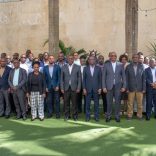Mozambique: Forestry operators call on government to set reference prices
Nyusi launches 2016/2017 agricultural campaign – Mozambique

presidencia.gov.mz
The focus of the 2016/2017 agricultural campaign should be based on specialization by province and by district, urged Mozambican President Filipe Nyusi on Friday.
Speaking at the official launch of the agricultural campaign in Mopeia district, in the central province of Zambezia, Nyusi said that maize, vegetables, poultry and eggs are determinant for food security. They are “obligatory national production”, and each province should specialise in at least one of them.
Maize and vegetables are compatible with most soils in Mozambique. Hence they, and poultry, can be produced throughout the country. It was the “direct mission” of the district administrators to ensure that this happens, said Nyusi.
“There should be no district without a solution for its sustenance”, he declared, urging managers in the public administration to set up mechanisms for monitoring, and for the transfer of knowledge from extensionists to the agricultural producers.
“The Mozambican economy is basically agrarian”, said Nyusi. “Households are the pioneers in the macro-economic indicators. Agriculture employs more than 80 per cent of the economically active population. It contributes about 25 per cent to the gross domestic product and is responsible for about 16 per cent of the country’s exports”.
There are about 4.3 million farms in Mozambique, added the President. Only 600 of these are large scale agricultural businesses. About one per cent of the farms, covering an average of five hectares each, combine subsistence farming with producing a surplus for the market. But the vast majority – 99 per cent are small household farms.
To escape from this scenario, Nyusi urged Mozambicans to participate in the transformation of subsistence agriculture into forms of agriculture than can guarantee both food security and income.
He recalled that, ever since independence in 1975, Mozambique had defined agriculture as the basis of development and industry as the dynamising factor. This was even enshrined in the country’s constitution.
“The national economic scenario has not always been favourable”, he added. “It has demanded pragmatic solutions, because of the combination of multiple adverse factors, both endogenous and exogenous. Weak financial power and vulnerability to natural disasters are some of these factors”.
Nonetheless, Nyusi said, agriculture remains at the top of the priorities on the national development agenda, so that Mozambicans can overcome their lack of food and nutritional security.














Leave a Reply
Be the First to Comment!
You must be logged in to post a comment.
You must be logged in to post a comment.